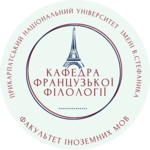METHODICAL SUPPORT FOR INDEPENDENT WORK
EXPLANATORY NOTE
Independent work is an important component and the foundation of training future specialists, as the goal of self-study is to master the learning activity and further apply it in practical sessions.
The practical implementation of this goal promotes integration tasks—complete merging of education and upbringing, the implementation of developmental learning principles, and the shaping of a future specialist’s personality.
Independent work in a foreign language addresses the following tasks:
– enhancing knowledge, skills, and abilities acquired during practical sessions;
– broadening students’ horizons;
– developing creative abilities, independence, and aesthetic tastes.
The effectiveness of learning activities depends on the student’s readiness for self-study and their individual qualities.
The ability to self-study is one of the most important prerequisites not only for mastering a foreign language but also for developing general independent activity skills.
The central issue in organizing independent work is ensuring high intrinsic motivation for mastering it.
The productivity of independent work in a foreign language depends on the psychological and pedagogical conditions of its organization: how students’ educational and cognitive activities are motivated, how professional communicative competence is implemented, and how their academic achievements are monitored.
The main task of self-study is to develop the skills and abilities necessary for mastering a foreign language, based on the specific goals of independent work.
Independent work is a self-guided educational and cognitive activity of a problematic, creative, and practical nature.
Independent work is based on students’ possession of the skills and abilities acquired in practical foreign language classes; therefore, it is crucial for students to fully utilize these skills and abilities during independent work.
CRITERIA FOR EVALUATING STUDENTS’ KNOWLEDGE AND SKILLS
The grade “excellent” is given to a student who has fully completed the course program, fulfilled all the tasks outlined in the curriculum, and demonstrated a high level of theoretical and practical knowledge.
To receive an excellent grade, a student must demonstrate skills in oral dialogue and monologue, as well as written communication using the course vocabulary, advanced abilities in two-way translation, listening, summarizing foreign texts, and drafting key types of contracts and business letters.
The grade “good” is given to a student who has fully completed the course program and demonstrated an appropriate level of course material knowledge.
A “good” grade is earned by a student who demonstrates good skills in listening, oral and written communication using course vocabulary, has solid two-way translation abilities, and can summarize foreign texts and draft key types of contracts and business letters.
The grade “satisfactory” is assigned to a student who has not fully completed the course program, meaning not all tasks outlined in the curriculum were fully accomplished.
A “satisfactory” grade is earned by a student with an adequate level of language preparation who demonstrates sufficient skills in summarizing and drafting key types of contracts and business letters.
The grade “unsatisfactory” is assigned to a student who has not completed the course program, failed to accomplish the course tasks, and did not demonstrate the required knowledge, skills, and abilities outlined in the course curriculum.

Department of French Philology
Vasyl Stefanyk Precarpathian National University
- 0342 59-60-81 kff@pnu.edu.ua
- вул. Шевченка, 57 м. Івано-Франківськ
 Le Chapeau de Catherinette!
Le Chapeau de Catherinette!